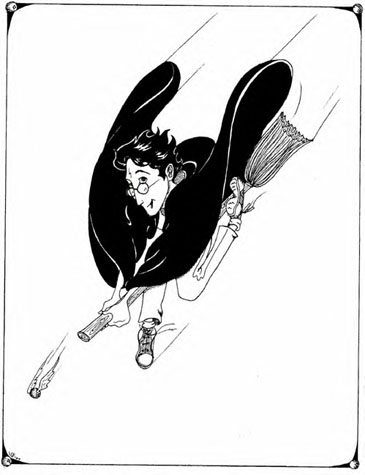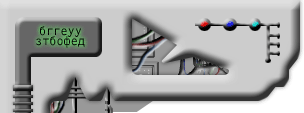Flint nearly kills the Gryffindor Seeker, which could happen to anyone, I'm sure..."
-- Lee Jordan, calling a Quidditch match between Gryffindor and Slytherin
| |
Weasley Is Our King |
 |
(Slytherin version, OP19)
Weasley cannot save a thing,
He cannot block a single ring,
That's why Slytherins all sing:
Weasley
is our King.
Weasley was born in a bin
He always lets the Quaffle in
Weasley will make sure we win
Weasley
is our King.
Weasley is our King,
Weasley is our King,
He always lets the Quaffle in
Weasley is our King.
|
(Gryffindor version, OP30)
Weasley is our King,
Weasley is our King,
He didn't let the Quaffle in
Weasley is our King.
Weasley
can save anything,
He never leaves a single ring,
That's why Gryffindors all sing:
Weasley is our King. |
Introduction
Quidditch, "the sport of warlocks," is the premier sport of the wizarding world. Everyone follows Quidditch. Quidditch is a fast, dangerous, exciting game in which two teams flying
on broomsticks compete for points scored by throwing a ball--the Quaffle--through hoops on either end of a large grassy pitch. Quidditch
is played by kids on broomsticks in the back apple orchard, by teams of students at Hogwarts, and by professional athletes
whose exploits are followed avidly all over the world. The World Cup matches attract hundreds of thousands of fans.
Quidditch falls under the jurisdiction of the Department of Magical Games and Sports, part of the Ministry of Magic. The professional organization is called the International Association of Quidditch. Professional matches are attended by
trained mediwizards and while there are many injuries, there are few deaths from Quidditch accidents. However, referees have
been known to disappear completely only to turn up weeks later in the middle of the Sahara Desert. There are seven hundred
possible ways to commit a foul in Quidditch, all of which occurred in a World Cup match held in 1473.
The name "Quidditch" comes from Queerditch Marsh, the place where the game originated in the 1000s. The colorful, exciting history of this thousand-year-old sport is detailed
in the excellent book, Quidditch Through the Ages, now available in a Muggle edition. Please buy yourself a copy soon -- the proceeds go to a very worthy cause indeed.
Rules
scoring
Equipment
Teams
The Quidditch Encyclopedia
defining terms, famous plays, maneuvers, and fouls
Professional Quidditch Pitches in Britain
Timeline: Quidditch
Other Quidditch organizations
Related links
Rules of play by Jeff Shear
Quidditch is played up on broomsticks up in the air.
There are three goal posts at either ends of a field. That field is called a Quidditch pitch. Quidditch has three balls. The
ball that scores the points is the Quaffle. The Quaffle is 12 inches in diameter and is made of leather bindings. The Quaffle
has made some different changes over the years. The Bludger is probably the most dangerous ball of all of them. It flies through
the air being hit by players called beaters. Serious injuries have been caused by Bludgers hitting people and causing them
to fall off their brooms. The third and most important ball is the Golden Snitch. The Golden Snitch is a tiny ball that has
wings and is enchanted. The first Snitch was a tiny bird that was very small and very tiny, but changes to the rules made
it illegal to use the actual bird. The current enchanted, winged ball version of the Snitch was invented by Bowman Wright
of Godric's Hollow. If the Seeker catches the Golden Snitch, his or her team earns 150 points and usually wins the match.
At either end of the Quidditch pitch are three hoops through which the Quaffle can be scored. In the center of the Pitch
is a circle where the balls are all thrown into the air and the match begins. As the balls are thrown, the players all gather
on the ground and then kick off as the referee blows his/her whistle. During the game a player can get a foul or break a rule.
Here are some fouls that a player can receive: blagging (applies to all players, it is when a player seizes opponent's broom
tail to slow or hinder), blatching (applies to all players, it is when a person is flying with the intent to collide), bumphing
(applies to beaters only, it is when a Beater is hitting a Bludger towards the crowd, necessitating a halt of the game as
the officials rush to protect bystanders. Sometimes used by unscrupulous players to prevent an opposing Chaser from scoring).
Scoring:
On the face of it, Quidditch scoring is unfair. In fact, it's so unfair that you can barely
call it a sport. Since catching the Snitch gains one side the equivalent of fifteen goals and ends the game so the other team
can't counter it, Quidditch is essentially a match between the two Seekers and nothing else. So what makes it so popular?
Do witches and wizards just watch it for the violence and fancy broom tricks?
Not at all. Quidditch is always played in a series. Unless you're playing a pickup game in the apple orchard, every Quidditch
match is part of a larger series of matches, and accumulated points are what count toward ultimate victory. The Quidditch
Cup at Hogwarts goes to the team with the most total points, not the one who has won the most matches. The standings we see
in the Daily Prophet for the British League (DP) list the teams in order of how many points they have in total, from Tutshill with 750 down to the lowly Cannons with only
230. Nowhere in the standings does it note how many matches each team won. Although we don't see evidence of it, there must
be a similar system for the World Cup, which would imply that Bulgaria and Ireland were the top scorers in the world that
year. Would it have been possible, then, for Bulgaria to have won the World Cup with Krum's capture of the Snitch, even though
Ireland won the match? Apparently so.
Quidditch equipment
pitch
Quaffle
Bludger
Golden Snitch
bats
broomsticks
whistle
Other Quidditch organizations
Related links

